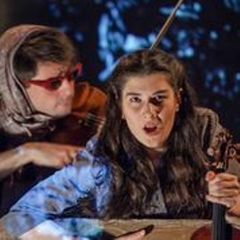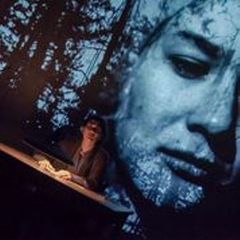|
Back
A Dream of Kafka and Kurtág New York
Sheen Theater, 18 Bleeker Street
03/18/2015 - & March 20, 22*, 2015
György Kurtág: Kafka-Fragments, op. 24
Annie Rosen (Voice), Jacob Ashworth (Violin)
Ethan Heard (Director), Reid Thompson (Set Designer), Beth Goldenberg (Costume Designer), Oliver Wason (Lighting Designer), Nicholas Hussong (Projecton Designer), Jon Carter (Hair/Makeup Designer), Heartbeat Opera in collaboration with Cantata Profana (Presenters)

J. Ashworth, A. Rosen (© Heartbeat Opera)
K stands for Kafka, and K stands for Kafka’s Doppelgänger, K. And K also stands for György Kurtág, one of the only two composers I have ever heard who understands the ruminating mysteries of Kafka himself. (The other was, of course Salvatore Sciarrino, whose Before The Law catches the writer’s conjurations.)
Sciarrino wrote a kind of episodic opera. Yet this masterpiece of Kurtág, Kafka-Fragments, like Kafka itself, fits no known genre. Nor were the fragments taken from his familiar stories. Rather, they are almost unbearably autobiographical, taken from the writer’s Blue Octavio Notebooks. Composed for violin and singer, Kurtág has taken 40-odd fragments, with no continuity, no cohesion, no coalescence, only the figments of structure, lasting from twelve seconds to four minutes. As with nearly all of Kurtág, the musical ideas are both ineluctable and enigmatic. Yet nobody could try and classify it. This is hardly opera, certainly not theater, and far more spontaneous-sounding than a violin-soprano recital.
So a new opera group in New York, Heartbeat Opera, has attempted, with remarkable success, to transform Kafka-Fragments into the closest thing I have heard yet approaching Antonin Artaud’s vision of “pure theater”. To simplify things, the theater where language (and even music) is irrelevant. Where the drama can be understood only as drama, with no reference to any outside objects.
Yes, we had here that splendid fiddler Jacob Ashworth, working with two different violins, playing each of the “fragments’ with such energy and passion that the bow-hairs were like weeping willow. And yes, we had Annie Rosen, one of those sopranos who can sing lyrically one minute and breaks like a racecar driver from top to bottom of the range with unerring exactitude.
That would be fine for a recital. Yet their two voices were actors as well. On a dingy stage, barely lit, set with a wooden table, a few chairs, an ancient television set and a whitewall for English translations from the German, these four characters (woman, man, two violins) enter with equally dingy 1930’s dress, he plunks down the violin, she takes off her coat, he casually uncases the violin, and with those opening two notes (C and D), she begins her first song. “The good walk in step...the others dance around them the dances of time.”.
What does this mean? Not much, except that now both of them offer physical drama to their selections. Some follow upon each other, some need space for both actors to roam the stage. The two actors are not necessarily in sync with each song. But they walk around, she becomes hysterical, loving, angry, frustrated. She sings a convoluted lullaby (“Wrap your cloak, your dream, around the child”), In a Kafka-like confession, she sings that she will finish the novel “even if it should lacerate my face.” And she tears up and scatters her pages, making the stage more a disheveled mess.
The music glows with slight melodies, one reminiscence (the Yiddish “Anniversary Waltz”), at times with Ms. Rosen, sometimes distant.
At one point, a Kafka fragment is stated as a musical homage to Boulez: “The true path goes by way of a rope that is stretched out not up high...more designed to make one stumble...”)
As the hour continues, the “fragments” become oh so Samuel Beckett-like (“There is a goal but no path”), with references to hiding, to ropes, to all the objects of the Kafka mélange of symbols.

J. Ashworth, A. Rosen (© Heartbeat Opera)
The set changes once, so that white wall darkens, and a grayish-black film comes on, of a deep forest, feet in the forest, one vision of a face (Ms. Rosen), more feet, more treetops at a discomfiting angle. And for anybody to try and explicate or justify or put into an architectural form these strange films...well, then Kafka-Fragments would have lost its effect.
In fact, so fascinating was the movement, the music, the singer and fiddler, in all their transformations, that I felt that the languages–both the sung German or the English translations–were almost a distraction, that in hearing or seeing these words, we were being disoriented from the “pure theater” itself. Perhaps they could improve the abstraction of the work if Ms. Rosen sung in Gjuha Shqipe with translations in Issan (Albanian and Laotian dialect), so that we could take these movements and emotions on their own merits, without wondering how they referred to the world outside Sheen Theater.
(Artaud thought only ancient Balinese would serve the same purpose.)
This is absurd, of course. But so is Kafka-Fragments, without, hopefully, any extraneous meaning.
Turning the Kurtág into an hour which could be cruel, filled with shards of terror, into those existential moments was the work of Ethan Heard, co-artistic director of Heartbeat Opera. His partner, Louise Proske was director of Offenbach’s Daphnis and Chloe which has been on the same stage this past week, and I have no doubt it was produced with as much sheer dreamlike imagination as the Kurtág.
I could not stay for that. Although the moment-by-moment dream songs of the Kurtág should be as ephemeral as the fragments themselves, I was transfixed by the concept, by the dark lighting, the changes of emotion and feeling from one “fragment” to the next, and couldn’t have conceived hearing anything else.
Whatever the next productions of Heartbeat Theater (in my view a name more suitable for a television soap), it may be difficult to be more original than this Kurtág production. Original and cryptic and an homage to this most wonderful composer.
Harry Rolnick
|